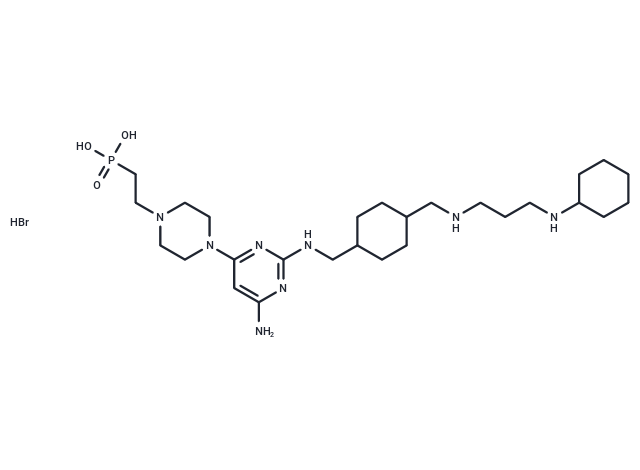Shopping Cart
- Remove All
 Your shopping cart is currently empty
Your shopping cart is currently empty

Burixafor hydrobromide (TG-0054 hydrobromide) is an orally bioavailable and potent CXCR4 antagonist with anti-angiogenic properties, potentially valuable in treating choroid neovascularization.

| Pack Size | Price | Availability | Quantity |
|---|---|---|---|
| 25 mg | Inquiry | 6-8 weeks | |
| 50 mg | Inquiry | 6-8 weeks | |
| 100 mg | Inquiry | 6-8 weeks |
| Description | Burixafor hydrobromide (TG-0054 hydrobromide) is an orally bioavailable and potent CXCR4 antagonist with anti-angiogenic properties, potentially valuable in treating choroid neovascularization. |
| In vitro | Burixafor hydrobromide mobilizes mesenchymal stem cells, attenuates inflammation, and preserves cardiac systolic function in a porcine model of myocardial infarction [2]. |
| Alias | TG-0054 hydrobromide |
| Molecular Weight | 647.644 |
| Formula | C27H52BrN8O3P |
| Cas No. | 1191450-19-7 |
| Relative Density. | no data available |
| Storage | Powder: -20°C for 3 years | In solvent: -80°C for 1 year | Shipping with blue ice. | ||||||||||||||||||||||||||||||
| Solubility Information | H2O: 50 mg/mL (65.02 mM), Sonication is recommended. | ||||||||||||||||||||||||||||||
Solution Preparation Table | |||||||||||||||||||||||||||||||
H2O
| |||||||||||||||||||||||||||||||

Copyright © 2015-2025 TargetMol Chemicals Inc. All Rights Reserved.